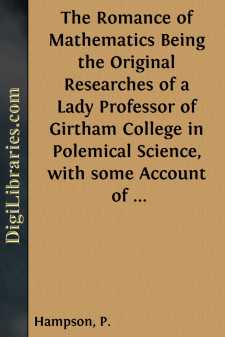Categories
- Antiques & Collectibles 13
- Architecture 36
- Art 48
- Bibles 22
- Biography & Autobiography 813
- Body, Mind & Spirit 142
- Business & Economics 28
- Children's Books 17
- Children's Fiction 14
- Computers 4
- Cooking 94
- Crafts & Hobbies 4
- Drama 346
- Education 46
- Family & Relationships 57
- Fiction 11829
- Games 19
- Gardening 17
- Health & Fitness 34
- History 1377
- House & Home 1
- Humor 147
- Juvenile Fiction 1873
- Juvenile Nonfiction 202
- Language Arts & Disciplines 88
- Law 16
- Literary Collections 686
- Literary Criticism 179
- Mathematics 13
- Medical 41
- Music 40
- Nature 179
- Non-Classifiable 1768
- Performing Arts 7
- Periodicals 1453
- Philosophy 64
- Photography 2
- Poetry 896
- Political Science 203
- Psychology 42
- Reference 154
- Religion 513
- Science 126
- Self-Help 84
- Social Science 81
- Sports & Recreation 34
- Study Aids 3
- Technology & Engineering 59
- Transportation 23
- Travel 463
- True Crime 29
Sort by:
PREFACE. Cynics may ask, how many have profited by the innumerable proverbs and maxims of prudence which have been current in the world time out of mind? They will say that their only use is to repeat them after some unhappy wight has “gone wrong.” When, for instance, a man has played “ducks and drakes” with his money, the fact at once calls up the proverb which declares that “wilful waste...
more...
by:
Anonymous
Brackley Hall was a fine old place in the lovely country of Devon and had been in the possession of the Etheridges for centuries. The park was beautifully wooded, and stretched down on one side to the coast, commanding in all directions the most enchanting views. Mr. Etheridge was a man of some forty years of age, of singularly handsome appearance, and bore evident traces of the Italian blood which...
more...
by:
P. Hampson
Oh, why should I be doomed to the degradation of bearing such a foolish appellation! A Girtham Girl! I suppose we have to thank that fiend of invention who is responsible for most of the titular foibles and follies of mankind—artful Alliteration. The two G’s, people imagine, run so well together; and it is wonderful that they do not append some other delectable title, such as ‘The Gushing Girl of...
more...
by:
Honore de Balzac
THE UNKINDEST CUT OF ALL. Is it a petty or a profound trouble? I knew not; it is profound for your sons-in-law or daughters-in-law, but exceedingly petty for you. "Petty! You must be joking; why, a child costs terribly dear!" exclaims a ten-times-too-happy husband, at the baptism of his eleventh, called the little last newcomer,—a phrase with which women beguile their families. "What...
more...
by:
Candace Wheeler
CHAPTER I DECORATION AS AN ART "Who creates a Home, creates a potent spirit which in turn doth fashion him that fashioned." Probably no art has so few masters as that of decoration. In England, Morris was for many years the great leader, but among his followers in England no one has attained the dignity of unquestioned authority; and in America, in spite of far more general practice of the art,...
more...
USEFUL PHRASES A further objection toAgain, can we doubtAgain, we have abundant instancesAlas! how oftenAll experience evinces thatAll that I have been stating hithertoAll that is quite true.All this, I know well enoughAll this is unnatural becauseAll we do know is thatAm I mistaken in this?Amid so much that is uncertainAnd, again, it is to be presumed thatAnd, finally, have not theseAnd, further, all...
more...
by:
James Gall
CHAP. I. Education is at present obviously in a transition state. The public mind has of late become alive to the importance of the subject; and all persons are beginning to feel awake to the truth, that something is yet wanting to insure efficiency and permanence to the labours of the teacher. The public will not be satisfied till some decided change has taken place; and many are endeavouring to grope...
more...
FOREWORD This report describes the effects of the atomic bombs which were dropped on the Japanese cities of Hiroshima and Nagasaki on August 6 and 9, 1945, respectively. It summarizes all the authentic information that is available on damage to structures, injuries to personnel, morale effect, etc., which can be released at this time without prejudicing the security of the United States. This report...
more...
PREFACE. The publishers of this work offer no apology for presenting it to the reading public, since the wide prevalence of the evils which it exposes is sufficient warrant for its publication. The subjects with which it deals are of vital consequence to the human race; and it is of the utmost importance that every effort should be made to dispel the gross ignorance which almost universally prevails,...
more...
Cocoa and Chocolate The term "Cocoa," a corruption of "Cacao," is almost universally used in English-speaking countries to designate the seeds of the small tropical tree known to botanists as THEOBROMA CACAO, from which a great variety of preparations under the name of cocoa and chocolate for eating and drinking are made. The name "Chocolatl" is nearly the same in most European...
more...











